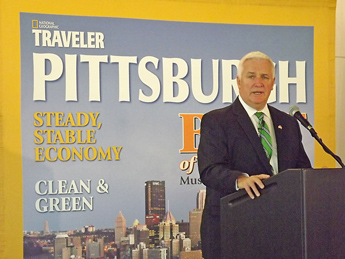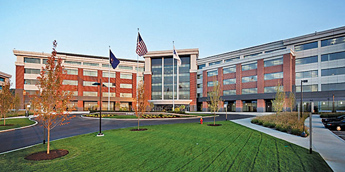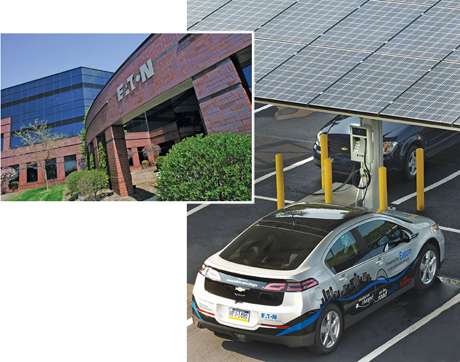“When you have big successes, you tend to attract top talent.”
That is the assessment of Rick McCullough, chief scientist and co-founder of Plextronics in Pittsburgh and vice president of research at the city’s Carnegie Mellon University (CMU).
McCullough believes that Plextronics — an international high-tech company that specializes in printed solar, lighting and other electronics — is one of those big successes.
The company’s focus is on organic solar cell and OLED (Organic Light Emitting Diode) lighting, specifically the conductive inks and process technologies that enable those and other similar applications. As a worldwide search for renewable energy becomes more urgent, Plextronics’ technology will enable the mass production of printed devices, such as low-cost organic solar cells and high-efficiency lighting.
McCullough believes that innovations like this — and others — coming out of Pittsburgh will drive the future of the region’s energy sector and ultimately change how the world uses energy.
Throughout the region, top talent is not just being attracted to established energy companies and innovative entrepreneurial startups; it is being grown from within by a confluence of higher education; government, academic and corporate technology research; and private firms seeking a leadership position in the new global energy marketplace.
From household brand names like Westinghouse Electric Co., U.S. Steel and Alcoa to emerging energy technology leaders like Aquion Energy, BPL Global and kWantera, Pittsburgh is well on its way to being known as the new center of American energy.
If that sounds like a stretch, consider this: the first oil well in the U.S. was discovered in this region of the Keystone State; workers have been mining the famous Pittsburgh Seam for coal for 250-plus years; and North America’s largest reserve of natural gas — the Marcellus Shale — has ignited a surge in energy exploration investment that is unprecedented in continental history.
On top of these abundant natural resources lies a supply chain that is robust and growing. The concentration of advanced materials manufacturing companies, heavy equipment makers and chemical firms in the Pittsburgh region is unmatched anywhere else in the nation.
In the nuclear, solar and wind energy sectors, this supply-chain dominance is emerging as well. Half of the world’s existing reactors are based on locally developed technology, resulting in proximate demand for supplies and services.
“Innovation in the energy sector will drive the economy in Pittsburgh,” McCullough says. “CMU is the number one research university in the country in terms of company startups per dollar. We create more startups than Stanford. And with the National Energy Technology Laboratory (NETL) here, research into fossil fuels is not going away. NETL is in charge of this research for the whole country. We have huge coal reserves and the Marcellus Shale. The research that comes out of Pittsburgh will help lead our country toward energy sustainability and energy independence.”
For Pittsburgh, a 10-county region with 2.5 million people and a history built on coal, steel and a blue-collar work ethic, the promise is nothing short of transformational.
‘We Have Turned the Corner’
The differentiator, however, will be innovation. In coal, natural gas, nuclear, solar, wind, energy storage and intelligent building technology, the Pittsburgh region is a national leader in research and development. Propelling this R&D are the National Energy Technology Laboratory, CONSOL Energy, Inc., — a multi-faceted energy producer of both coal and natural gas and operator of the U.S.’s only private coal R&D facility — and university research at CMU and the University of Pittsburgh, as well as nearby Penn State University and West Virginia University.

“If you combine the energy resources we have in Western Pennsylvania with the infrastructure we are creating, the innovation in this region is really taking hold,” says Pennsylvania Gov. Tom Corbett. “We can do all kinds of business in the energy sector in Pittsburgh. We can develop polyethylene and other products. It continues to be a selling point when we take trade missions internationally. Southwestern Pennsylvania is within a day’s drive of 45 percent of the U.S. population. We have inexpensive energy; and the products that we will be manufacturing can be exported around the world.”
The finish line for the region, says the governor, is being known as the global energy leader. “We have turned the corner in being known that we have the energy available,” he says. “We are working at becoming a leader in developing that energy. It is ironic that we are coming back to Drake’s Well in Titusville, Pa. We were the leader there 100 years ago. Now, we just have to tap into our huge energy potential in a very balanced way and protect the environment. It is not going to occur overnight, but it is going to grow. We are no longer a newborn. We have generations of potential ahead.”
Dennis Yablonsky, CEO of the Allegheny Conference and its affiliate, the Pittsburgh Regional Alliance, the marketing and economic development organization for the 10-county Pittsburgh region, calls the region’s collection of energy assets “rather unique in America.”
Yablonsky notes that “we have assets in three energy dimensions — natural resources, supply chain and innovation. The total economic impact is 800 companies employing 50,000 people in direct energy jobs and generating $19 billion in economic activity — 16 percent of the regional economy. We have engineering and manufacturing companies in the supply chain; Westinghouse in nuclear; power management and green buildings; one of the largest concentrations of energy research; and multiple universities doing research and multiple corporations doing energy research.”
The Marcellus Shale is a game-changer, says Yablonsky. “The Marcellus Shale is clearly a big part of what’s going on right here,” he says. “We are seeing more electricity generated from natural gas, as well as the use of natural gas as an alternative fuel. Even larger is the rebirth of manufacturing in the petrochemical industry as the result of liquids coming out of the Marcellus Shale. This includes the proposed $4-billion ethane cracker that Shell is considering building right here in our region.”

Coming to fruition is the same kind of innovation that has defined the region for over a century, says Yablonsky. “Coal is known here. The first natural gas pipelines were built here,” he says. “Alternating current was developed by a Westinghouse engineer here. The first nuclear power plant was developed here. The first coal scrubber was made here. Steel was here because of low-cost energy and transportation. Energy has been a key part of our economy for as long as we’ve had one.”
Giving Pittsburgh the competitive edge moving forward is its talent, says Yablonsky. “The talent base in the energy sector has always been here,” he notes. “We have a disproportionate number of people in this field. We just finished mapping out the top occupations where there is big demand from the energy companies and short supply. We have identified 14 key occupations that will be in demand in various energy sectors.”
Assisting Pittsburgh area firms in tapping into this talent base is an innovative new program called ShaleNET, a federal grant-funded initiative that addresses the work-force recruitment, training and retention needs of the natural gas industry.
“ShaleNET has the potential to be a global model for work-force training,” says Dr. Byron Kohut, Western Hub director of ShaleNET.
The purpose of ShaleNET — which is unique in the country — is to match talent with the positions that natural gas companies need to fill in the Pittsburgh region. The program is the result of a grant funded by the Department of Labor, Employment and Training Administration. Its mission is to design a comprehensive recruitment, training, placement and retention program for high-priority occupations in the natural gas drilling and production industry.
To put it into perspective, the drilling of a single well requires 400 people working in nearly 150 different occupations. Some 47 percent of a well’s work force consists of jobs that do not require a four-year college degree. This includes jobs in general labor, heavy equipment operation, and commercial and off-road truck driving.
ShaleNET’s aim is to provide resources to assist in narrowing the skills demand gap by improving pre-employment training and identifying candidates who are compatible for these jobs.
The ShaleNET grant will develop a recruitment, training, placement and retention program to provide the gas industry with the workers it needs, including high-priority occupations such as derrick operators, rotary drill operators, service unit operators, welders and commercially licensed drivers.
How Innovation Works in Pittsburgh
A notable trend for Pittsburgh is the amount of home-grown talent that is choosing to remain in the region. “We have seen a marked demographic shift in Pittsburgh,” Yablonsky says. “For two years in a row, we have seen more people moving in than leaving. We are increasing the percentage of people who graduate from our universities and stay in the region. We have 36 colleges and universities in the region, and more of our graduates are opting to stay here to pursue their careers.”
Another game-changing trend is the fact that Pittsburgh is not waiting for energy innovation to happen; it is jumpstarting innovation with seed capital and other support for entrepreneurs and startup companies in a variety of fields.
Innovation Works (IW), an initiative of the Pennsylvania Department of Community and Economic Development, is driving innovative business in Southwestern Pennsylvania. In 2011, IW assisted 189 companies with financial resources and other help, leading to 454 jobs being created or retained in the area.
Revenues at IW-assisted firms climbed to $1.1 billion in 2011. A number of them are operating in the energy sector.
Terri Glueck, director of community development and communications for Innovation Works in Pittsburgh, says that IW participates in a $10 million energy fund through the state of Pennsylvania. “We are proud to work with the Pittsburgh Technology Council and the Allegheny Conference to provide seed capital, mentoring and networking resources to innovative startup firms throughout our region,” Glueck says.
Joining this wave of innovation in Pittsburgh are companies like TharGeothermal, kWantera, Appalachian Lighting Systems and Optimum Power Technology.
Lalit Chordia, president and CEO of TharGeothermal, says his company focuses on reducing energy and water consumption in buildings, using carbon dioxide as a natural refrigerant. “We run a direct exchange of heat with the ground,” he says. “In the winter, we move the heat from the ground to the building. In the summer, we move the heat from the building to the ground. Since 30 percent of all energy is used to heat and cool buildings, we can save energy customers on peak energy consumption during the day. We are growing, and we will even have a couple of spinoffs coming in the near future.”
Mark DeSantis, CEO of kWantera, says his firm is able to pull data from smart meters in real time to help facility managers better manage power consumption in their buildings. “We manage energy with data,” he says. “We do quality demand management and purchasing. Corning is our largest customer. They make the glass for the iPhone. A small change in the quality of their power can result in a big change in their production process. We can reduce the consumption level and the time of the load. We do all of this with massive amounts of data.”

Tanya Rings, vice president of program operations for Appalachian Lighting Systems, says her company makes advanced LED lights that are smarter, more energy efficient and built to last 200,000 hours. “We sold our first lights six years ago to a city in Western Pennsylvania,” she notes. “We have since expanded internationally and are now in Canada, Australia and the Virgin Islands. Our lights are 70 to 80 percent more efficient than traditional LED lights. The costs of the lighting are paid for out of the energy savings. Our customers typically see savings in their pockets by the end of the first year.”
Glen Chatfield, president of Optimum Power Technology, says his company focuses on improving the efficiency of the pumps used in the natural gas pipeline infrastructure in Western Pennsylvania. “About 50 percent of the cost of gas is associated with the distribution of the gas,” he notes. “Our technology improves the efficiency and reliability of the interstate pipeline compression capabilities. Our technology has been field-proven. We have the ability to dramatically decrease the vibration inside of the pipeline. We have applied for patents worldwide.”
There are two major reasons why all of these entrepreneurial innovators are choosing to build their companies in Pittsburgh: the talent base is here, and so are the customers.
“Two of our largest customers — Alcoa and U.S. Steel — are based right here in Pittsburgh, and the presence of so many large industrial energy consumers in the region makes this a natural choice as the long-term home of our company,” says DeSantis. “Secondly, we owe a great deal to CMU. Most of our technical team comes from there. Without that talent, we could not thrive.”
A Campus for the Nuclear Age
Small companies aren’t the only ones bringing high-tech innovation to Pittsburgh’s energy sector. Several of the region’s household names are also leading the charge.
At Westinghouse, some 6,000 employees in the Pittsburgh region are involved in all kinds of electrical and nuclear engineering jobs, including developing four nuclear power plants in China — projects that cumulatively employ people in 22 U.S. states.
They are doing this from the 100-acre headquarters of Westinghouse in Cranberry Township, Pa. About 4,200 employees work at the 1-million-sq.-ft. complex.
“The ability to stage our growth was very important to us,” says Russ Bussard, director of real estate and facilities for Westinghouse. “We had to change our design several times during our construction. This campus will serve us well for the foreseeable future.”
Located 19 miles from downtown Pittsburgh, the headquarters represents one of the largest corporate building projects in recent history in southwestern Pennsylvania. “This area is still growing at a solid pace,” says Bussard. “Cranberry Township was really ahead of its time in terms of traffic control when we built this campus. And we had no trouble getting the labor we needed for the three years in which we were constructing this complex. Everyone who worked on this project was very proud of the work they were doing, and 95 percent of the steel used in this building was made in the U.S.”
The campus is state of the art in many ways, featuring a 1.6-mile paved walking trail; day-care center that can accommodate 150 children; full-service cafeteria that remains open all day; 13,000-sq.-ft. fitness center; volleyball, tennis and basketball courts; and a soccer field.
Westinghouse occupies 8.5 million sq. ft. in 100 locations around the world, but Cranberry Township is the company’s flagship property, notes Bussard. “Westinghouse has the best nuclear technology in the world, and the bulk of that work is done right here at our headquarters,” he says. “The future here looks very good.”
Anthony Greco, senior vice president of human resources and corporate relations at Westinghouse, says there are many reasons why his firm chose this location for its new global corporate headquarters.
“One is the access to talent,” he says. “We have a very good work force from an experience standpoint. From a new college graduate standpoint, it is a great area in which to hire workers. Ohio State, Virginia Tech, Michigan and Penn State are all within easy reach of us. When we were looking for a new headquarters and engineering center, that had a lot of attraction for us. We were doing a lot of hiring at the time. We hired 5,000 people over five or six years.”

Greco adds that “the Pittsburgh area is an unknown jewel as a place to live. Low-cost housing, a lot of cultural amenities, a lot of major sports teams and other things make this a very nice community in which to live. These assets are great for young singles and young married couples. The schools are good too.”
Transportation assets made a difference as well, says Greco. “From a transportation perspective, we have a very good international airport in terms of access to various markets,” he notes. “We have a lot of people who travel a fair amount. Those were really the main reasons why we chose this location. We did look at other areas of the country. We narrowed our search down to Charlotte and the Pittsburgh region.
“From a customer standpoint, having people who understand the technology is very important,” Greco adds. “Customers often request specific employees by name. Our people strategy is very important. We have a specific human capital retention strategy.”
All of that added up to a huge win for the Pittsburgh region, as Westinghouse chose to remain in the area and — given its global foothold in nuclear technology — appears poised to grow on a worldwide basis.
New Era of Coal & Gas Technology
This growth pattern is being repeated at other large companies based in Pittsburgh. CONSOL Energy Inc., Range Resources and Eaton Corp. are three of them.
CONSOL, one of the leading diversified energy companies in America, specializes in producing coal and natural gas. Founded in 1860, the firm today employs more than 9,000 workers, operates 12 bituminous coal mining complexes in four states and reports coal reserves of 4.5 billion tons. The natural gas division reports reserves of more than 3.5 trillion cubic feet.
The company’s shining light is the CNX Center, the firm’s new 309,000-sq.-ft. headquarters building, the first facility in the Southpointe business park in Canonsburg, Pa., to be LEED certified.
More than 50 energy-related companies call Southpointe home, including many of the region’s largest natural gas producers. Located 17 miles south of Pittsburgh, Southpointe houses several Fortune 500 firms and more than 50 firms directly in the energy sector or supporting it.
Southpointe, a development of Horizon Properties Group LLC, is a high-tech park as well, and the Southpointe Golf Club hosts the PGA Tour event known as the Mylan Classic. The development has been so successful, in fact, that construction is now under way on Southpointe II.
“We chose this site because it is regionally central to our coal mines in Pennsylvania, West Virginia and Virginia,” says Steven Winberg, vice president of research and development for coal conversion and power development for CONSOL. “We also have reserves in Ohio and Illinois. This is a very modern facility that will house us for the next 30 to 40 years.”
Shaped in the form of the letter “C” — as in CONSOL — the building houses all corporate support services for the company and has a capacity of about 485 people.
The firm also operates an 88-acre R&D campus in South Park, Pa. “We are the only coal company with an R&D operation,” says Winberg. “We do a lot of research on pollution and reducing greenhouse gas emissions.”
Winberg notes that “safety is the core value of CONSOL. Our safety record is quite good. Our chairman started the Absolute Zero Program — no accidents. It stuck. It has become what we are. We are two times better than other coal companies with regard to safety. We will have a year when we will have zero loss-time injuries.
“Our second core value is compliance,” he adds. “Third is continuous improvement. If we get all of these core values accomplished, profitability will fall into line as well.”
John Owsiany, director of water systems and operations for CONSOL, says that innovation guides all aspect of the company’s operations, including how the firm manages its water resources.
“We can repurpose and reuse our treated water,” he says. “This is an untapped resource here. There is a whole potential business segment coming out of this. We treat 36 billion gallons of water each year. There has to be a greater benefit, and we are in the process of finding it.”
Tom Joseph, founder of Epiphany Solar Water Systems in New Castle, Pa., is helping CONSOL find that benefit. “We started our company three years ago to develop drinking water for people in parts of the world where it is not available,” says Joseph. “The same technology we use to help provide drinking water to people overseas can be used to treat water in the coal and gas industry. So we have shifted our focus to do that.”
Epiphany uses a complex system called direct solar distillation to treat contaminated water. Dirty water passes into the distillation unit and instantly vaporizes due to the intense heat focused on the unit. During the vaporization process, any dissolved solids, such as heavy metals, separate, and living organisms such as bacteria are killed due to the intense heat.
Epiphany is now moving forward with CONSOL on a pilot project to treat contaminated water from the company’s drilling operations.
Winberg notes that “sustainability has a lot of facets to it. Our 9,000 employees live, work and play in the same communities in which we do business. We live and die based on the health of the communities that are on top of our assets.”
Winberg sees the company’s resources as holding the key to a manufacturing renaissance in the Pittsburgh region. “This region has a lot of low-cost fossil energy,” he says. “We have a history of manufacturing in Pittsburgh. That manufacturing will turn around and come back to this region because of our energy and water resources. Out West, water is very rare and expensive. We have water here in abundant supply.”
He adds that the talent base in Pittsburgh is exceptional as well. “We have a great university system here too,” Winberg says. “There is an opportunity for this area to have a long-term, sustainable future in manufacturing. The American public is starting to realize that you can’t live off of a services economy.”
Also expanding is Range Resources, a natural gas extraction company with 1.1 million acres in the Marcellus Shale Play. Range recently moved into 180,000 sq. ft. in five stories in Southpointe II. Some 400 employees — about half of the firm’s U.S. work force — are based at the new complex.
Company executives say that the presence of so many well-trained petroleum engineers in the region — from Pitt, Penn State and other schools — makes Pittsburgh the perfect fit for Range.
The Marcellus Shale find prompted Range to open its first field office in the region in 2007, leading to the establishment of a company presence in Southpointe. Range is considered a “first mover” in the shale play, meaning that it is at the forefront of harnessing the energy potential that currently resides inside the rock formation deep underground.
Range uses a process called hydraulic fracturing to harvest natural gas from the Marcellus Shale, which is more than a mile below the earth’s surface. Using this technology, the firm’s leaders say that future corporate growth potential is enormous.
“Our technical and operational teams have made tremendous advancements in evaluating and developing several different prospects, shales being one of the biggest,” says Mark Whitley, senior vice president for Northern Appalachia and Southwest Divisions for Range. “We currently have future resource potential that could grow the company by a factor of ten times the present size of Range.”
Future Energy Engineers Grown Here
The folks at Eaton Corp. are taking advantage of the rising energy tide as well. A global technology leader in diversified power management solutions, Eaton registered sales of $16 billion in 2011. Eaton employs 73,000 people around the world, but much of the company’s advanced R&D work now takes place in Pittsburgh.

In 2008, Cleveland-based Eaton completed construction of a new $24-million, 120,000-sq.-ft. addition to its electrical business headquarters in Moon Township in suburban Pittsburgh. Built to achieve LEED Silver certification, the facility uses 50 percent less electricity through various energy-saving technologies, including Eaton’s own power management systems.
“This facility was an outgrowth of the old Westinghouse operations here,” says David Loucks, manager of power solutions and advanced systems for Eaton. “Look at the energy history of this area. Why were all the steel mills built here? It wasn’t because iron ore was here. It was because coal was here. Now we have coal, nuclear, solar, wind, and energy management companies like Eaton, in addition to a great university system to support them.”
Talent will always keep Pittsburgh in the running for high-tech energy projects, notes Loucks. “We are training the power system engineers of the future,” he says. “There is a large percentage of power engineers who are retiring in just a few years. We have 55-to-65-year-olds, and we have 25-year-olds, and there is no one in between.”
Loucks adds that “we hire three or four engineering graduates from local colleges and universities every year.”
Mark Horner, senior manager of global communications for Eaton, says, “There is an energy hub emerging here and there is a tremendous talent pool in this region. Pittsburgh is becoming a place on the map. The old lament was that all of our young talent would leave. Now Pittsburgh is considered a very cool place to be. It also has a reputation as a green hub. We have more LEED certified buildings per capita than any other city in America. And Pittsburgh has become a test lab for innovation.”
Loucks concurs, noting that “this is an attractive place to raise a family. It is a very affordable place to live. This is the longest I have ever lived someplace. I have always moved after three years, and I have been here for 12.”
While the heavyweights in the energy industry continue to make headlines in the Pittsburgh region, a number of companies in the rapidly growing energy storage sector are leading a power surge of their own.
Aquion Energy Inc. and BPL Global are two such Pittsburgh firms whose technological advancements are changing the way batteries are built and the way the smart grid is run.
Aquion, a developer and manufacturer of revolutionary sodium ion batteries and energy storage systems, earlier this year selected a former Sony site in Westmoreland County, Pa., for its first full-scale factory.
The company announced it is leasing space within a large existing facility in East Huntingdon Township from the Regional Industrial Development Corp. of Southwestern Pennsylvania. Aquion said it expects to create more than 400 high-tech manufacturing jobs by the end of 2015.
Aquion is investing over $50 million into approximately 250,000 sq. ft. in the 2.8-million-sq.-ft. facility, according to Ted Wiley, vice president of business and market development for the Pittsburgh-based firm.
“After considering all of our options, including aggressive offers from a number of other U.S. states, we concluded that southwestern Pennsylvania is the best location for Aquion to establish its first high-volume manufacturing operation,” said Scott Pearson, CEO of Aquion.
Wiley says several factors proved pivotal to the deal. “It was a combination of the quality of the work force, proximity to our pilot operations and corporate headquarters, and the quality of the incentives package that the state put together,” he says. “From our perspective, there is an existing group of people that were there when the plant was run by Sony, and they have the technical capabilities that we need. There are millwrights and other technicians who are skilled in the disciplines of engineering and manufacturing. They will staff our plant at a management level.”
Wiley calls the project the ultimate home-grown win for Pittsburgh. “This technology originated in a CMU lab and has grown from zero to 100 employees in the last two years,” he says. “Other energy storage companies are also choosing to locate here. And they are locating here because you have all the domain expertise in Westinghouse and major energy programs at Pitt and Carnegie Mellon. CMU hosts the annual Electricity Industry Conference, and Pitt has the Center for Energy in the Swanson School of Engineering. Together, they are developing the next generation of engineers and managers for the world’s energy infrastructure.”
Wiley adds that the manufacturing project was extremely competitive and that “other states were considered. In the end, we received tremendous support from the Pennsylvania Governor’s Office. They created a competitive incentives package and worked closely with us to make this deal happen.”
Making the Electric Grid Smarter
BPL Global, which serves the electric utility industry by improving the reliability and efficiency of smart grids, is also growing in the Pittsburgh area.
BPL moved into new offices in Foster Plaza in Pittsburgh in April and employs 15 people in a 4,500-sq.-ft. office suite. The company also maintains offices in China, India, France, Kuwait and Sao Paulo.
“We specialize in smart-grid technology,” says J. Thorne King, vice president of marketing for BPL. “We build systems that offer a positive return on investment. The grid is changing fundamentally. Electric vehicles are starting to emerge and are putting more stress on the electric grid. We make the grid more intelligent. We help our customers save energy and capital and improve infrastructure.”
BPL makes software and hardware, including monitors for transformers. “The strength of our offering is from the substation to the customer,” King says. “Our solutions from a smart grid standpoint provide visibility to the distribution grid. With our technology, the power company will know where the problems are before they occur. They won’t have to wait for customers to report power outages.”
Clients of BPL include FirstEnergy, Arizona Public Service, State Grid in China, and customers in India, among others. R&D for BPL takes place in Columbus, Ohio, and Beaverton, Ore.
“We have engineering staff there, but we are a global company,” says King. “We pull information from the whole company to define our products and solutions. We draw on all of our resources, including our Pittsburgh office.”
King says BPL, which was founded in Pittsburgh in 2004, “chose Pittsburgh for a number of reasons. It is a great city with an entrepreneurial spirit. It has reinvented itself a number of times. Energy has been a focus of the city and state. There is a strong public-private partnership here. It is an ideal place to locate a company in the energy space.”
BPL received initial seed funding from Innovation Works. “A couple of entrepreneurs started the company here,” King says. “Pittsburgh has an excellent work force that is hard-working, bright and capable. Seed capital was a significant factor here, and we have ties to Pitt and CMU.”
Long term, notes King, “we want to be a leader in this marketplace globally. Our commitment is to be a growth business, and we intend to grow the company globally.”
BPL also benefits from being part of a rapidly expanding network of energy companies and energy-related organizations in the region.
“The ability to tap into the local resources that make sense for your company to grow — that is the real value of Pittsburgh,” says King. “There is a unique dynamic of how business connections happen in Pittsburgh.”
This Investment Profile was prepared under the auspices of the Pittsburgh Regional Alliance. For more information, contact Phil Cynar at pcynar@pittsburghregion.org or 412-392-4555, ext. 4573. On the Web, go to www.pittsburghregion.org.
